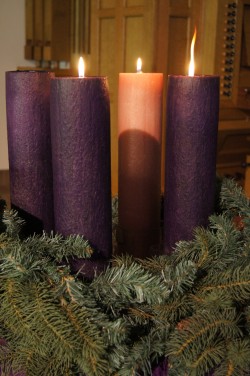by Christine F. Ketelsen, Oblate of St. Scholastica Monastery
Zephaniah 3:14-18a
Philippians 4:4-7
Luke 3:10-18
We welcome the return of Statio*, suspended during the pandemic. Rejoice in the Lord! and give joyous thanks for bringing us through these difficult times and continuing to help us with grace.
Still, we ask, “How can we be good?” and “How can we join with Jesus?” In Advent, we continue to ask this, realizing that we need to keep asking and strive to be with Jesus from his birth in a stable to his Second Coming in glory.
People are working extra hard in the pandemic to save and succor the sick, the stricken, the dying. We can only do what we can do – we can’t all be medical professionals or chaplains, but we can do our part. Like the little boy in the carol asked,
“What can I give him, Poor as I am? If I were a Shepherd I could give a lamb. If I were a Wise Man I could do my part.
What I have I give him: Give my Heart.”
When I first looked at the Gospel for tomorrow, I thought, “What is John the Baptist doing in here? Where did he come from?” So, I read the other reflections in Give us this Day, a monthly book of daily Scripture readings, prayers, and meditations, and remembered asking myself the same question last year. My memory does not seem to improve with age.
John the Baptist was always one of my favorites. When I was a child in England, I thought he must have founded the Baptist Church. There was one on every street corner and they seemed to have lots more fun than the Anglicans. Better hymns, louder praying, and CLAPPING, which would never happen in our boring Church! When I was a teenager, one of the Saturday night satire shows on TV did a consumer report on Churches and concluded that the Church of England was actually the best value, because although you didn’t get much out of it, you didn’t have to put anything into it either.
But I digress! As a retired psychotherapist with a decidedly analytical bent, I love the passage where Elizabeth’s baby “leaped in her womb” when Mary entered the house. This was a starting point for me to learn about inter-uterine communication. I am reminded of a story we read when we were doing televised readings in the chapel for the Sisters on Benet Hall during lockdown. It was about a little boy who sang to his baby sister while she was still in the womb. After the baby was born, she was sick and expected to die, but the brother was allowed to visit and sang You are My Sunshine just as he had before she was born. The baby began to recover. That kind of a story is such a tearjerker, and most people seem to enjoy them and to speculate about “soul to soul” communication. I believe that baby girl was waiting for her brother to come and sing to her, to welcome her, and to give her the courage to live!
And in Advent we await the coming of the Christ Child, but also the Second Coming. As we wait it is essential that we prepare ourselves for these miracles and make sure that we are ready. We must be worthy of Jesus’ coming to us and greeting us.
I came to soul searching late in life, when I met Sister Lois Eckes at McCabe Renewal Center. I found these wonderful women – Sister Lois, Sister Theresa Spinler, and +Sister Molly McGough (not forgetting Pacem the dog) – and they taught me to become what I still strive to be. They brought me here.
Previously, I was ego searching and matching up developmental stages – but I knew that God was out there somewhere, and I didn’t know that God was within me and everyone I met.
I thank God for the example of Benet Hall Sisters and the suffering of some close friends and relatives as they figure out what they/we/I are waiting for. I don’t know, of course, but will spend the rest of my life figuring it out.
*Statio is the pause before formal prayer that brings us out of time and opens us to the Spirit. At First Vespers on Saturday evening, it is marked by an entrance procession where we reverence the altar and then bow to the presence of Christ in each other.

